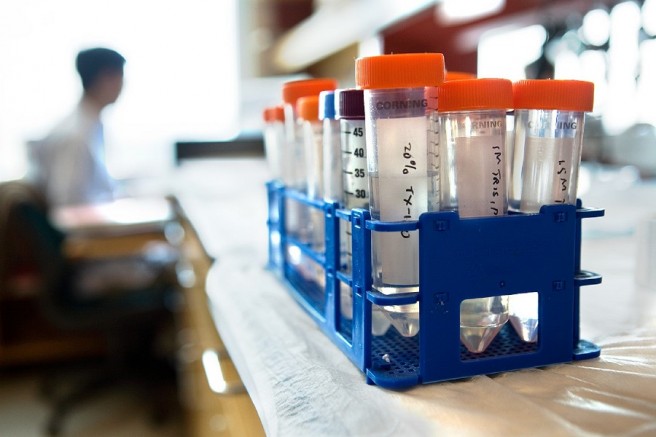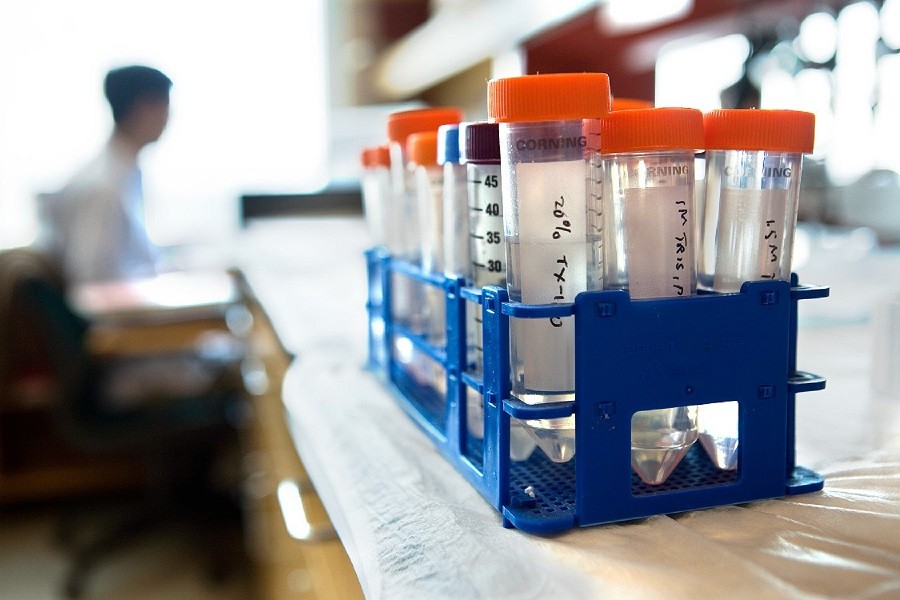Primary tabs
Graduate Studies

Graduate study in nutrition at Cornell offers the most comprehensive opportunity in the nation for nutrition education, research, and international and community service. The program is based in Cornell’s Division of Nutritional Sciences.
You will have exceptional opportunities to work with faculty who have a broad range of research interests, which span the fields of biochemistry, epidemiology, economics, physiology, genetics, psychology, sociology, anthropology and other related fields.
We have four “concentrations” in the Graduate Field of Nutrition:
- Molecular Nutrition
- Human Nutrition
- Community Nutrition and
- International Nutrition.
These concentrations refer broadly to the level of analysis at which the research question is investigated; i.e., at the molecular or mechanistic level (Molecular Nutrition), at the whole person or whole animal level (Human Nutrition), at the community level (Community Nutrition), and at the international level (International Nutrition). These concentrations should not, however, be viewed as “silos”; many faculty members align with more than one of these concentrations.
On this page you will find:
- About the Graduate Field of Nutrition
- Graduate degrees in Nutrition (M.S.; Ph.D.; Ph.D/R.D.)
- Financial support
- How to tailor your coursework: curriculum, minor fields of study, required courses, A exam / B exam information
- Faculty support: special committees, selecting a mentor, our faculty
- Services & facilities, interest groups, shared division equipment
- Admissions information and how/when to apply
- Other resources, plus student spotlights and what life at Cornell is like
learn more detail about the graduate degrees we offer by visiting these pages below
Financial Support
Financial Support
Ph.D. students admitted into the Graduate Field of Nutrition are guaranteed financial support from the Division of Nutritional Sciences (DNS) for 5 years (10 academic year semesters and four summers) on the condition that they maintain good academic standing, have a DNS faculty member serve as their Special Committee chair, and meet expectations in conducting their teaching and research responsibilities. The support consists of a twelve-month stipend, full academic year tuition, and coverage for the individual health insurance plan. Financial support may be in the form of teaching assistantships, graduate research assistantship, Cornell and DNS fellowships, external fellowships, traineeships, or other Cornell funding and may vary each semester. All graduate students in the Graduate Field of Nutrition are expected to serve as a teaching assistant for at least one semester.
“The university is committed to an equitable, supportive, and professional environment for graduate education. Assistantships help students develop academic rigor and creativity, independent judgment, intellectual honesty, and the ability to communicate their knowledge, while providing financial support.”
-Cornell University Graduate Student Assistantships Policy
Teaching assistants (TA) are appointed to support teaching of a course and may assist in teaching a section, leading discussions and/or laboratory sections, and preparing and grading exams, among other responsibilities. Because students funded through assistantships are expected to make progress towards their research degrees, assistantship hours for TA appointments are limited to 15 to 20 hours per week, averaging no more than 15 hours per week. Cornell is committed to helping students have a successful teaching experience and provides many exceptional teaching resources, workshops, and training programs.
When appointed on a graduate research assistantship (GRA), students focus on thesis or other degree-related research of a type that is required from all candidates for the degree. Because a student devotes considerable time to dissertation research, the time spent on research connected with the project is expected to be significant. GRAs are typically supported by grants obtained by their chair. Fellowships obtained by a student’s chair or by the student also support students in pursuing their graduate studies and research. More information regarding assistantships can be found in Cornell’s Graduate Student Assistantships policy.
Additional Funding Opportunities: Cornell University also provides additional competitive funding opportunities to support graduate students. You can explore Cornell and external fellowships for new and continuing graduate students here. The Graduate Field of Nutrition nominates incoming students for Cornell and Diversity fellowships.
Our students also successfully compete for a variety of Cornell-funded research awards, such as those from the Office of Engagement Initiatives, the Genomics Scholars Program, Atkinson Center, and the Society for the Humanities, to name a few. Students are also highly successful in receiving national and international research fellowships.
Research master’s programs do not provide financial assistance at this time. Please see the graduate school for information about costs and funding, including loans.
Tailor your coursework
Tailor your coursework
Training within the Graduate Field of Nutrition is individualized. YOU are able to tailor your coursework to meet your individual interests and goals. The Field of Nutrition has few coursework requirements for students in the Ph.D. Program as described below. In general, your coursework is decided based on discussions with the members of your special committee. During the first year, while you are deciding on your committee chair who serves as your primary research mentor, the Director of Graduate Studies (DGS) serves as your temporary advisor, assisting you as needed in decisions about coursework and answering any questions that you may have about the program and your course of study.
Ph.D. students in the Graduate Field of Nutrition choose two minor fields of study for their degree. Current students have selected minors in over 30 different graduate fields ranging from education to soil science to biophysics.
The most commonly chosen minors are:
- All incoming graduate students are required to take NS 7030 Seminar in Nutritional Sciences (attendance only, you do not present a seminar your first semester). Ph.D. students attend four additional semesters of NS 7030, and make three presentations (total 5 attendances and 3 presentations). Doctoral students have the option of replacing one presentation and one semester of attendance in NS 7030 with the successful completion of NS 7040, the Division of Nutritional Sciences’ grant writing course. NS 7040 also serves as an opportunity to develop a proposal, which typically contributes to important preparation for the A exam.
- Many of our graduate students elect to take macronutrients (NS6320), micronutrients (NS6310), and a biometry series (BTRY 2010 and 6020) also in their first year.
- You may sign up for dissertation research credits any semester (NS 9990 Ph.D. Thesis). The number of credits is variable.
Examination for Admission to Ph.D. Candidacy (A exam): To qualify as a Ph.D. candidate, each graduate student must pass what is called an A exam. The Graduate School requires that the A exam be completed by the end of the student’s 6th semester. Passing the A exam means the graduate faculty believes that you are ready to proceed with the degree program.
Dissertation defense (B exam): The B Exam is an oral defense of your Ph.D. dissertation. The B exam consists of a public research presentation and then an oral defense with your special committee members.
More detailed information on A and B exams is available from the Graduate School or check out our FAQs section.
Our faculty support graduate studies
Our faculty support graduate studies
Each graduate student in the Ph.D. program is required to form a special committee. This committee is responsible for guiding your graduate work. The committee advises on coursework, reviews your progress, and generally oversees all aspects of your graduate work. The special committee includes the chair who is your research mentor and will supervise your dissertation research; two faculty members representing your two “minor” subjects or areas of study; and a field-appointed member representing the Field of Nutrition. The minor members represent the minor fields of study and provide expertise to strengthen your dissertation research and/or to provide you with training to support your career goals.
You must select your special committee chair during the first year of the program. Typically, the choice of minors and the selection of additional committee members involves discussions with your chair. The Graduate School requires that your full committee to be established by the end of the third semester of study. You may make changes to your committee after it is established; it is important to establish your committee early because the special committee guides your graduate work.
You will need to meet with the Director of Graduate Studies (DGS) when you have most of your committee members identified; in this meeting you will discuss the appointment of a Graduate Field of Nutrition faculty member to serve as your field-appointed member. This faculty member should provide a broad view of the discipline of nutrition, thus this committee member typically has interests that complement the other members of your committee (for example, if you were studying zinc supplementation in population level interventions, your field member might be a molecular nutrition faculty member studying animal models of zinc nutrition). Typically, students come up with two or three faculty members in the Field of Nutrition who are mutually acceptable to the student and the DGS, and then the DGS appoints one of them to serve in this capacity.
Contact us at dnsgrad@cornell.edu
Barbara J. Strupp, Ph.D., Director of Graduate Studies
DoraLee Knuppenburg, Graduate Field Assistant
Selecting a mentor during your first year/rotations: The major goal in your first year is to select a primary research mentor, who serves as your special committee chair. Because the nature of research varies among our concentrations, this process differs by concentration. A subset of first-year students who are interested in working with human or molecular nutrition faculty with wet laboratory-based research programs will participate in “laboratory rotations.” Students participating in rotations will spend three periods of 4-8 weeks each (depending on the nature of the project) working on projects in laboratories of interest. This allows incoming students to maximize their potential of finding the best fit for a “laboratory home” and to develop skills in a variety of laboratory techniques. For other concentrations that do not require rotations, you can learn about and compare different research groups by attending the research meetings of different professors, and by talking with the potential mentors and their current students. In all four concentrations, the special committee chair must be selected by the end of the first academic year.
Your selection of a research mentor should be based on the research topic as well as on the mentoring style of the faculty member thus keeping in mind the mentoring style that is most likely to support your success as a student. Another tip provided by current students is that what you study for your dissertation is unlikely to be what you study throughout your career. It is a good idea to keep in mind the type of training that you would like to prioritize for your doctoral training, understanding that all careers are built over time and the Ph.D. training is an important and key driver of your future.
The faculty, postdoctoral associates, technical staff, and graduate students have expertise in the physical, life and social sciences, and they are jointly committed to fundamental and multidisciplinary research and its translation to nutrition practice and policy.
Nutrition at Cornell is committed to knowledge generation, discovery and improving human health in the areas of:
- Precision Nutrition and Metabolism
- Lifecycle Nutrition
- Food and Nutrition Systems
- Social and Behavioral Nutrition.
Your access to a world-class institution
Your access to a world-class institution
- Cornell Institute of Biotechnology, an umbrella for several campus-wide shared facilities including:
- Bioinformatics facility: cloud computing and data storage
- Flow Cytometry Facility: cell sorting and analysis
- Genomics Facility: Sanger and “next-generation” sequencing and sample prep/QC
- Imaging Facility: confocal microscopy, high-resolution X-ray Computed Tomography, high-resolution ultrasound, laser capture microdissection
- Proteomics and Metabolomics Facility: targeted and non-targeted metabolomics, proteomics, user-operated HPLC and HPLC-MS
- Human Metabolic Research Unit (HMRU): infrastructure for investigators in the Division of Nutritional Sciences who conduct research involving human participants
- Stem Cell and Transgenic Facility: design and production of transgenic mouse models
- Animal Telemetry/Surgery Core: resource for assistance with mouse surgical procedures
- Transcriptional Regulation & Expression Facility: provides end-to-end genomics profiling services including RNAseq, small RNA sequencing, and ATACseq
- Cornell Statistical Consulting Unit: provides statistical expertise to the entire Cornell community through consulting, instruction (workshops, training, instructional materials), and contract services
- Center for Vertebrate Genomics (VERGE): enhancement of research and education in vertebrate genetics and functional genomics at Cornell
- Cornell Stem Cell Program: part of NYStem program fostering cross-disciplinary collaborations among laboratories studying stem cells
- Comparative Cancer Biology Program: facilitates comprehensive interdisciplinary training and rigorous hypothesis-driven research in comparative cancer biology
- Cornell Center for Immunology: builds synergistic collaborations to enhance research capacity and scientific discovery in immunologic sciences
- Cornell Neurotech Collaboration: developing technologies and powerful new tools needed to reveal the inner workings of the brain, with a particular focus on how individual brain cells and complex neural circuits interact at the speed of thought
- Microbiome Supergroup: typically meets once a month
- Cornell Center for Health Equity: university-wide initiative bridging Cornell’s New York City and Ithaca campuses
- Cornell Center for Social Sciences: accelerates, enhances, and amplifies social science research at Cornell
- Sable Systems Promethion Metabolic Screening System (16 individual units) used to quantify mouse movement, food/water intake, metabolism, and substrate (carbohydrate and lipid) utilization.
- LightCycler 480 II Real-Time PCR (qPCR) is required for performing quantitative real-time PCR.
- BioRad MyCycler Thermal Cycler gradient-enabled thermal cycler used for conducting PCR.
- NanoDrop 200C UV-Vis Spectrophotometer is required to precisely measure nucleic acids (DNA and RNA) and protein concentrations. This is a critical step for many downstream molecular biology applications such as PCR, molecular cloning, ELISA, western blotting, and others.
- BeckmanCoulter Optima L-90K Ultracentrifuge is utilized for separation of subcellular fractions by high-speed centrifugation.
- EMD Millipore Simplicity Ultrapure Water System distills and deionizes water. Ions in water often interfere with biochemical assays.
- Sorvall RC-5C Plus Centrifuge is used for phase separation by centrifugation (fundamental for RNA, DNA, and protein extraction protocols).
- Beckman Coulter Scintillation Counter is used for measuring radiolabeled tracers for cell growth and DNA synthesis assays.
- Tecan Spectrafluor Plus Microplate Reader is used for conducting biochemical, enzymatic and ELISA assays for measurement of reactive oxygen species, apoptosis, and other enzymatic activities in cells/tissues. These assays could be colorimetric, fluorescent or luminescent. This plate reader capable of performing all three types of measurements.
- Agilent Seahorse XFe24 Analyzer measures the rate of change of dissolved oxygen and pH in the media immediately surrounding living cells cultured in multi-well plates.
- Nexcelom Celigo Imaging Cytometer for high throughput brightfield and fluorescent cell imaging of either live or fixed cells cultured in multi-well plates.
- Protein Simple FluorChem E System detects chemiluminescence from Western Blots over a 5-log dynamic range using a high-resolution charge couple device (CCD) sensor.
- Shimadzu TQ8030 GC/MS-MS is a triple-quadrupole gas chromatograph/mass spectrometer capable of fragmenting analyzed masses for improved signal-to-noise and sensitivity in stable isotope tracer experiments and metabolomics measurements.
Admissions Information
Admissions Information
Applicants should use the online interactive application form provided by the Graduate School to apply for admission to either the MS or PhD degree programs, and follow its instructions for the submission of transcripts and letters of reference.
Cornell University expects all applicants to complete their application materials without the use of paid agents, credentials services, or other paid professional assistance. The use of such services violates University policy, and may lead to the rejection of application materials, the revocation of an admissions offer, cancellation of admission, or involuntary withdrawal from the University.
The Field of Nutrition typically accepts Ph.D. students for both the Fall and Spring semesters, and M.S. students for Fall only. Most Ph.D. applicants are admitted in the Fall. For admission in the Fall semester, completed applications must be received by the Graduate School no later than December 1. We are not currently taking applications for Spring admissions.
The Graduate Field of Nutrition will NOT require GRE scores. Any scores that are submitted will be masked before applications are reviewed.
All applicants must provide proof of English language proficiency. There are 3 ways this may be done:
- Submit Scores – Provide official IELTS Academic or TOEFL iBT test scores that meet the Graduate School’s minimums.
- Request a Standing Exemption in your application for admission – On the first page of the application form, you will attest that you meet one of the standing exemptions outlined below. Provide documentation if required.
- Request a Special Exemption – In exceptional cases, applicants may ask for a special exemption. Guidelines and the request process are outlined below.
Please review the Graduate School’s website for detailed information.
All applicants must have completed coursework in chemistry including general chemistry, organic chemistry and biochemistry. In addition, applicants to the Ph.D. program wishing to concentrate in Community or International Nutrition also should have completed courses in statistics and/or the social sciences. Those wishing to concentrate in International Nutrition should have had significant work experience in a developing country. Applicants wishing to concentrate in Molecular Nutrition should have completed course work in molecular biology, cell biology, and/or genetics. Prior research experience is advantageous for all applicants.
More information can be found here.
Cornell Resources for Graduate Students
Contact us at dnsgrad@cornell.edu
Life at Cornell

Ithaca is a city located at the tip of Cayuga Lake in the Finger Lakes region of central New York. Ithaca is known for its abundance of parks, gorges, waterfalls, trails, and other beautiful and functional outdoor spaces and the many recreational and social activities they support. Performance arts, sports, festivals, wine tastings, and family friendly events are just a few of the rich and varied activities that our students enjoy. Dining options abound and Ithaca after hours provides a variety of nighttime entertainment, music, and social gatherings.
Check out the hundreds of attractions and things to do in Ithaca including the farmer’s market, museums, restaurants, galleries, performing arts centers, wineries, festivals, fruit picking, parks, and more!
Check out these websites:





















